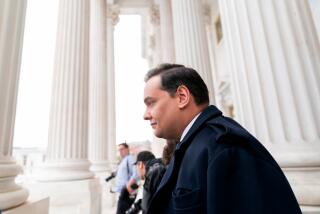Documentary Explores Evil Image on TV : Businessmen Now Wear the Black Hats
- Share via
NEW YORK — The American businessman has usurped the place of ethnic thugs and corrupt Watergate-era politicians and is now the closest thing television storytellers have to a universal villain, a new television documentary says.
The immoral executive has become such a cliche that as a crime story or soap opera plot unfolds, informing viewers that someone is a businessman seems sufficient to explain any manner of evil, much like identifying him as a Nazi or a devil-worshiper, documentary producer Michael Pack said.
“The idea that businessmen are going to take guns out of their top drawer and threaten their competitor is a view of the ruthlessness of business that, as one person said to us, Karl Marx would reject,” Pack said.
The show, “Hollywood’s Favorite Heavy,” was funded by grants from several companies and produced and written by Pack and co-producer Daniel Polin. It will be shown in March on Public Broadcasting System stations.
The program illustrates its points with a montage of clips showing businessmen ordering enemies killed, toxic wastes dumped and using other tactics that would make even the old robber-barons think twice.
Or, as super-villain J. R. Ewing says after another “Dallas” character asks how he can live with himself: “It’s not hard. Once you give up integrity, the rest is a piece of cake.”
Pack admitted that there have always been evil businessmen in the media, but he said in the last there were plenty of Horatio Alger-type stories as a counterbalance.
Pack said that today, the old common theme of films such as “Executive Suite,” in which a good businessman triumphs over a bad one in the same company, has been replaced by plots in which someone from the outside--a detective or reporter or prosecutor--has to come in and clean house.
Even in situation comedies, the change is noticeable. Businessman fathers abounded in 1950s and 1960s family shows, but today’s top-rated shows are different.
“Cosby is a doctor,” Pack said of comedian Bill Cosby on his highly popular television series. “The guy on ‘Family Ties’ works for PBS.”
There is no one simple reason for the change in perception of the American businessman. Pack said he believes that Watergate, the consumer movement and the onset of computers have all done their part to make people suspicious of big institutions and those who run them.
There is also a default factor. Pack said the rise of special interest groups representing blacks, Latinos, homosexuals, Arabs, Orientals and so on has gradually trimmed the list of “acceptable” villains, leaving only businessmen, who don’t seem to be offended.
“Businessmen don’t care in the same way Arab-Americans might,” Pack said. “If you’re a top executive in a major company, it doesn’t hurt you.”
When Pack and Polin began to research their theory that businessmen are negatively stereotyped on television, an odd thing happened: No one bothered to say it wasn’t so.
“People had different explanations for it, but nobody denied it,” Pack said. “We had expected to have to spend a lot of time proving it.”
Pack said he found no real anti-business bias in Hollywood. Rather, the media people they interviewed just saw the device as the quickest way to tell a given story.
“They (producers) think real hard about what will sell next year, who will be the right person to cast in a role. But they don’t think hard enough about the kinds of ideas and values their shows are communicating.”
More to Read
The complete guide to home viewing
Get Screen Gab for everything about the TV shows and streaming movies everyone’s talking about.
You may occasionally receive promotional content from the Los Angeles Times.






